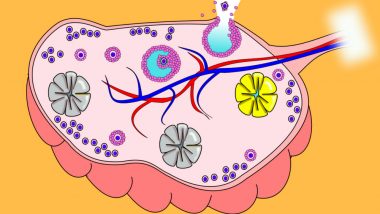Polycystic Ovary Syndrome or PCOS has become a widespread menace, affecting one in ten women in the reproductive age worldwide. One of its common hazards is infertility. Most women are diagnosed with the problem in their twenties or thirties, although it is known to affect girls as young as 11 years of age, even before they start menstruating.
Women with PCOS often exhibit symptoms such as acne, excessive body hair, weight gain and oily skin. Obesity, insulin resistance, lifestyle problems and a genetic predisposition are the known causes of PCOS. But there was never a consensus about the exact cause of the disease. And if findings of a recent study are to be believed, scientists may have found the most common cause of PCOS, which could be a complete game changer in the way the disease is viewed.
According to the researchers, the commonest cause of female infertility could be caused by a hormonal imbalance before birth. Paolo Giacobini from the French National Institute of Health and Medical Research has discovered that PCOS could be caused by exposure to a hormone called anti-Mullerian hormone while in the womb.
The Anti-Müllerian Effect
According to the study, Giacobini and his colleagues found out that pregnant women with polycystic ovary syndrome have 30 percent higher than normal levels of the anti-Mullerian hormone. Since PCOS is genetic, scientists came to a conclusion that exposure to this hormone in the womb could be the cause of the disorder.
To put the theory to test, the scientists injected the hormone into pregnant mice. The female offspring of the tested rats were shown to exhibit symptoms of PCOS, including late puberty, ovulation problems, fewer offspring and delays in pregnancy. The researchers were able to find out that the excessive anti-Müllerian hormone also triggered increase in testosterone.
A Cure In Sight
Another great thing to have emerged from the study is that scientists have also found a way to mitigate the effects of the anti-Müllerian hormone, cetrorelix. It is an intravenous drug given to women to control their hormones. Treatment with this drug reduces PCOS symptoms in the affected mice.
Given the excellent results in reducing PCOS, the drug is now being considered for a clinical trial in women before the end of the year. Giacobini said that the drug may help infertile women affected with polycystic ovary syndrome in getting pregnant.
The findings of the study go on to explain why women with PCOS in their 30s and 40s get pregnant with relatively more ease. The anti-Müllerian levels in women decline with age, signalling the body to reduce fertility. But in women who have PCOS with elevated anti-Müllerian levels, age brings down the hormone to normal fertility levels!
(Reference: Elevated prenatal anti-Müllerian hormone reprograms the fetus and induces polycystic ovary syndrome in adulthood)
(The above story first appeared on LatestLY on May 19, 2018 12:10 AM IST. For more news and updates on politics, world, sports, entertainment and lifestyle, log on to our website latestly.com).













 Quickly
Quickly


